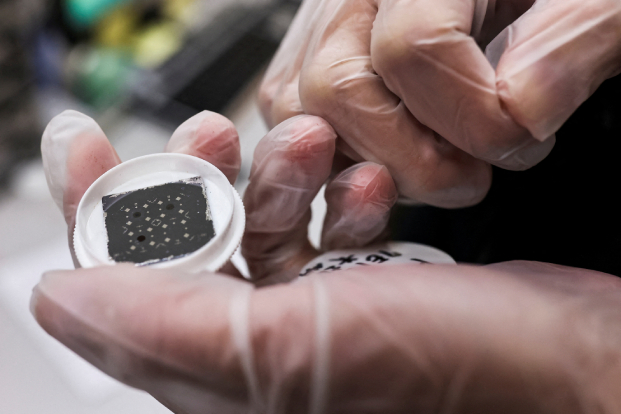US senators scaled back a proposal that placed new curbs on the use of China-made chips by the US government and its contractors, according to the final version of the measure published on Tuesday.
The move followed pushback from trade groups like the US Chamber of Commerce, which pointed out how such measures will raise costs. It is the latest example of industry efforts to weaken proposals aimed at crimping China’s burgeoning tech sector.
The measure, unveiled in September by prominent US lawmakers, would have required US federal agencies and their contractors to stop using chips made by top Chinese chipmakers SMIC, YMTC and CXMT.
Also on AF: China Gambles on Graphene to Win the Global Microchip War
The final version no longer forbids contractors from “using” the targeted chips and pushes the compliance deadline back to five years from the immediate or two-year implementation deadlines included in the first version.
It also narrows the scope of the restrictions, noting they only apply to items destined for the government’s “critical systems”. These include telecoms or information networks involving intelligence activities or command of military forces or weapons, among others.
Chips made by SMIC are commissioned by companies all over the world and can be found in products as diverse as cell phones and cars. They are difficult to identify because chips are not typically labeled with the names of the companies that manufacture them.
SMIC was blacklisted by the Trump administration over concerns the company aids the Chinese military. YMTC is under investigation by the Commerce Department over whether it violated US export controls by selling chips to blacklisted Chinese telecommunications company Huawei Technologies Co Ltd and could be blacklisted soon.
The planned curbs come amid an ongoing chip-war between the US and China.
US Industry Pushback
The measure, added as an amendment to the National Defense Authorization Act (NDAA), drew fire from the Chamber of Commerce and other trade groups.
In a letter last month, the groups said it would be costly and difficult for companies to determine whether SMIC manufactured the chips contained in a vast array of electronics. Its signatories included telecommunications and defence industry groups.
The Chamber of Commerce also argued in the letter that rooting out such chips from common appliances like toasters or forcing federal contractors like paper suppliers to take on such a monumental task would not further US national security.
The provision was modelled on the 2019 NDAA, which barred the US government and its contractors from using telecoms or video surveillance equipment from China’s Huawei, ZTE, Dahua, Hytera or Hikvision.
Companies are still struggling to comply with the law, as regulators have yet to finalise rules fleshing out the curbs, a problem referenced by the Chamber of Commerce in its letter.
Lawmakers released a final version of the NDAA on Tuesday night. The legislation is expected to pass the Senate and House of Representatives this month, and be sent to the White House for Biden to sign into law.
The Chinese Embassy in Washington said it “firmly” rejects the inclusion of negative language about China in the legislation and said that the Chamber of Commerce letter “shows that arbitrary disruption and damage to the global industrial … supply chains serves no one’s interest”.
- Reuters, with additional editing by Vishakha Saxena
Read more:
Nvidia Offers New Chip to China That Meets US Limits
China Chip Giant Hua Hong Set for $2.5bn IPO in Shanghai
UK Blocks Chinese Takeover of Microchip Factory in Wales
China Rushes to Hire Foreign Microchip Engineers – Nikkei
























